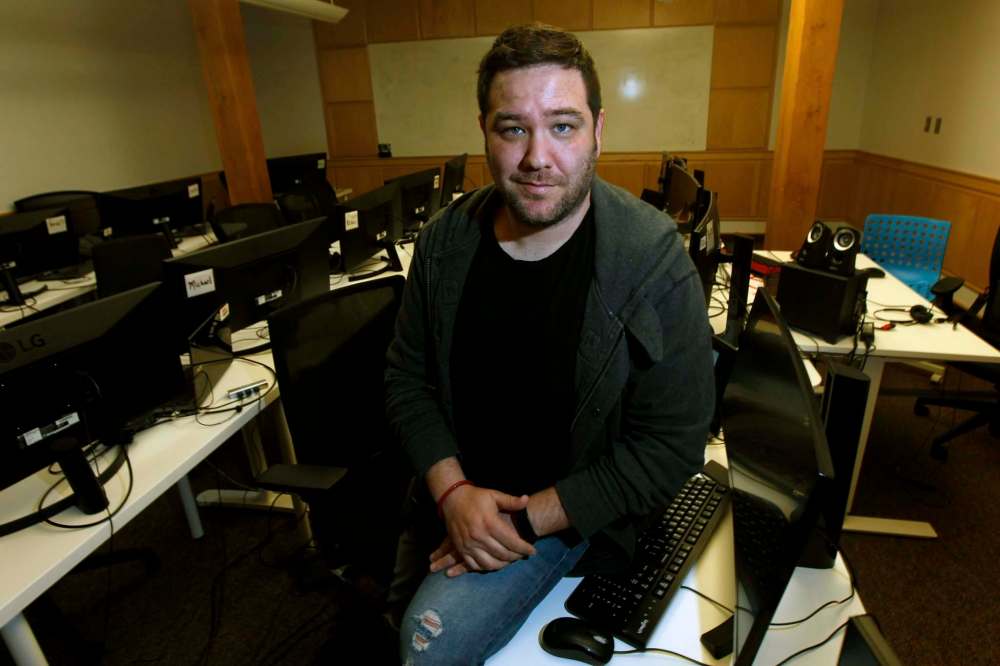They get IT Newcomer helping newercomers upgrade their skills so they can land tech jobs
Read this article for free:
or
Already have an account? Log in here »
To continue reading, please subscribe:
Monthly Digital Subscription
$0 for the first 4 weeks*
- Enjoy unlimited reading on winnipegfreepress.com
- Read the E-Edition, our digital replica newspaper
- Access News Break, our award-winning app
- Play interactive puzzles
*No charge for 4 weeks then price increases to the regular rate of $19.00 plus GST every four weeks. Offer available to new and qualified returning subscribers only. Cancel any time.
Monthly Digital Subscription
$4.75/week*
- Enjoy unlimited reading on winnipegfreepress.com
- Read the E-Edition, our digital replica newspaper
- Access News Break, our award-winning app
- Play interactive puzzles
*Billed as $19 plus GST every four weeks. Cancel any time.
To continue reading, please subscribe:
Add Free Press access to your Brandon Sun subscription for only an additional
$1 for the first 4 weeks*
*Your next subscription payment will increase by $1.00 and you will be charged $16.99 plus GST for four weeks. After four weeks, your payment will increase to $23.99 plus GST every four weeks.
Read unlimited articles for free today:
or
Already have an account? Log in here »
Hey there, time traveller!
This article was published 23/04/2019 (2425 days ago), so information in it may no longer be current.
One of the truisms in business nowadays is that employers can’t ever find enough skilled information technology workers.
But there is an interesting intersection occurring between unfilled IT jobs and a growing willingness from some employers to hire motivated people who don’t necessarily have post-secondary education in the field… and Pablo Listingart may have a solution.
Listingart, the founder of a charitable enterprise called ComIT, has developed three-month intensive training programs for entry-level coders in areas like JavaScript. The graduates are landing jobs at enviable rates with some of the best employers.

In the past year and a half, about 100 graduates from his courses have found jobs in the IT industry in Manitoba and Saskatchewan. Working with organizations like the Immigrant Centre in Winnipeg, most of the participants in ComIT’s courses have been new Canadians who want to achieve upward social mobility.
As a new Canadian himself — Listingart and his wife are about to take their Canadian oath of citizenship next week, four years after emigrating to Winnipeg from Argentina — he is particularly empathetic to the challenges new Canadians have in breaking into the job market.
Among the new twists Listingart is applying to a problem that has vexed both employers and employment agencies is that the courses offered by ComIT are free. They’re also hard and registration is screened to accept the folks who want it the most.
Listingart worked in the IT industry for more than 10 years out of his hometown of Buenos Aires for large companies like IBM and Microsoft and got the entrepreneurial bug before he came to Canada. Although ComIT does not pay him a salary, Listingart still takes consulting work and is about to launch an English version of a fee-based Spanish-language mobile app that teaches people to code.
‘There are many new immigrants who want to go for more in their lives, but for different reasons, they can’t. Here in Canada, there are people who can’t get a loan to go to college or university and they are being left out from society. Maybe they are brilliant’
– Pablo Listingart
“I came from a technology background… and it was clear this industry was going to grow and it’s also clear that there are lots of people being left out from society in some way,” he said. “There are many new immigrants who want to go for more in their lives, but for different reasons, they can’t. Here in Canada, there are people who can’t get a loan to go to college or university and they are being left out from society. Maybe they are brilliant.”
“I saw this gap and I wanted to help people land jobs,” Listingart said. “We do well in this industry. We can live well. I wanted to find a way to give back.”
This year ComIT will offer courses in six Canadian cities and 15 in Latin and South America, where the enterprise started eight years ago. After only a couple of years of operation out of Winnipeg, Listingart has attracted the attention and support from companies including Great-West Life, Wawanesa, IQmetrix and Skipthedishes.
Choosing to operate as a charitable enterprise, in addition to working at encouraging employers to hire its grads, ComIT is perpetually on the look-out for funding.
Listingart proved the concept in Argentina, at first doing everything himself and covering all costs out of pocket. Since then, he’s received a $1 million donation from Google.org and another sizable donation from the JP Morgan Foundation.
“In South America, we now have enough funds to run for five more years without any new financing,” he said.
In Canada, he’s going course to course, but interest is growing faster than he thought. This year, he’ll be offering 17 courses in six cities in Canada and he’s now working on leads to introduce it in the United States. He’s waiting on word about Federal government funding that could add another 10 courses over the next three years.
Riley Pickerl, director of software engineering at Skipthedishes, said the company sponsored three ComIT courses in 2018 and will do another four this year (by sponsoring courses, Skip does not guarantee jobs to grads). Last year, the Winnipeg food delivery company hired seven ComIT grads.
“We believe there is talent… from people who don’t necessarily have the privilege of attending a post secondary institution,” he said. “We have partnered with Pablo to find passionate talent that we would be able to fast-track through and bring on to the Skip team.”
He said at least a couple of them have already risen to intermediate and senior developer positions.
ICTAM (the Information and Communications Technology Association of Manitoba) was one of the first ComIT sponsors in Manitoba, using it as a subcontractor to deliver programs that ICTAM secured funding for. Kathy Knight, ICTAM’s CEO, said there was about a 75 per cent employment rate including a good percentage of women participating, an extra bonus because ICTAM is trying to introduce more women into the IT business.
“He screens for attitude and aptitude,” Knight said. “If they have the right attitude and the desire to learn and succeed and complete the program, that makes a big difference.”
Listingart says he often gets push-back from potential employers who tell him they will only hire university of college grads, but he says his own entrepreneurial instincts just kick in, making him try that much harder to convince employers that he can produce capable employees.
Pickerl said the courses are not easy and the accomplishment of completing the course and the presence of a passion for the career at hand is an attractive combination.
“If you are willing to put in the time to learn the material — and it is absolutely a difficult program, being introduced to enterprise level infrastructure with little to no experience — it is something we value highly,” he said.
martin.cash@freepress.mb.ca

Martin Cash has been writing a column and business news at the Free Press since 1989. Over those years he’s written through a number of business cycles and the rise and fall (and rise) in fortunes of many local businesses.
Our newsroom depends on a growing audience of readers to power our journalism. If you are not a paid reader, please consider becoming a subscriber.
Our newsroom depends on its audience of readers to power our journalism. Thank you for your support.









